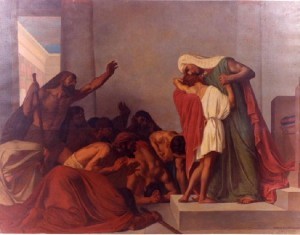The first of the seven days leading up to Easter Sunday is upon us and for those who have been fasting over Lent, the end is in sight. For others, Monday in this Great and Holy Week has another meaning.
For Greeks, Holy Monday sees the beginning of preparations for the celebration of Easter in villages across the country with people painting flower pots red, and by using paint to outline their yards with white lines.
However, for the Greek Orthodox Church, Holy Monday is a day dedicated to Joseph Pangalos, the 11th son of Jacob, one of the Biblical patriarchs.
Joseph was a virtuous character and chose to live his life as such — something which bothered his older brothers who decided to sell him as a slave.
He was sold to Potiphar, the captain of Pharaoh’s guard in Egypt. Potiphar’s wife tried to seduce Joseph, but he refused her advances. This enraged the rejected woman who then made false claims that Joseph tried to rape her and had him sent to prison.
Joseph left prison after interpreting one of Pharaoh’s dreams in which he predicted seven years of abundance followed by seven years of famine. He advised the Pharaoh to store a surplus grain, and by doing so, saved the people of Egypt.
Following the fulfillment of the prediction, Joseph became Vizier, under the name of Zaphnath-Paaneah and was responsible for food distribution in Egypt.
His family survived the famine and as his brothers were on the verge of starving to death, they presented themselves to him and asked for his help.
Although the brothers did not recognize Joseph, he realized who they were and helped them, showing the extraordinary greatness of his soul.
For the Greek Orthodox Church, Holy Monday is also known as the day which commemorates the withering of the fruitless fig tree; a symbol of judgment that will befall those who do not bring forth the fruits of repentance.
Source: greekreporter
Ask me anything
Explore related questions





